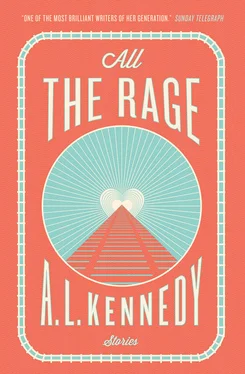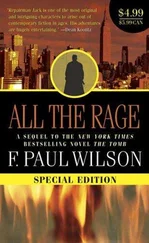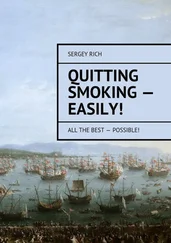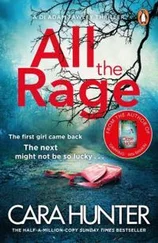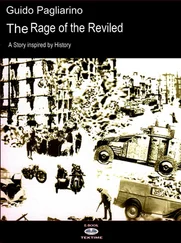‘I’m sorry.’
And there is a way of saying this which means we can’t continue and a way of saying it which means we can keep on and manage and we can be all right.
‘I’m sorry. I’m sorry, too.’
HIS EARLIEST ADULT experience — he wakes up in a hospital wearing stiff clothes, cold clothes. Also there is a some kind of mistake in his head. He is not alarmed, the boy, only puzzles in the cloth- and sour-tasting darkness of the ward until he knows it is a ward and that something has gone wrong and put him here.
‘Nurse?’
The boy does not say this. He would never have thought to call a nurse: his character is undemanding and, besides, he cannot imagine needing anything beyond perhaps an explanation for the maritime rush which is catching at his ears and this dizzy, laden weakness of his thinking.
‘Nurse?’
It is this word that woke him, he believes — its repetition. First word of his alternate life.
‘Nurse?’
Footfalls consent to be summoned and close on him, as fast as irritation — heel-thumps before toe-thumps and a squeak each time they argue with the floor.
The nurse’s shape halts three beds down from the boy and interrupts the glimmers of a window in a way that seems peculiarly shocking.
‘What do you want, then?’
She is nothing like the boy’s mother, has a voice which is entirely strange to him, and sharpened — it sews through the air, passes over him, then on. He hears it ting against the farthest wall.
‘Well?’
‘Can I have a glass of water?’ The melody of the question is indecisive, apologetic.
‘No.’
And the nurse-shape begins to leave again, even more quickly, while the boy wonders if the other child, the thirsty one — who sounds like a boy, too — will maybe die soon from a lack of water. Water does seem such a plain and reasonable requirement that only some fatal intention would allow it to be denied.
Lying still and heavier than he has ever been, the boy recoils very slightly within his unfamiliar pyjamas. He believes, almost at once, that these are part of the belongings of some previous small patient who has died while on the ward, odds and ends reused for the benefit of others and no further trace remaining. There are numerous, uncountably numerous, places where the boy’s skin is being touched by the dead-boy cloth. The jacket cuffs nuzzle clammily against his wrists. It is very likely his arse is where a dead-boy’s arse has been, and moreover his parts which are meant to be secret are comfortably settled in these trousers, perhaps because this is how the dead-boy’s used to rest. His mickey where another mickey was. A smoky rush seems to rummage across him as he considers this and his left hand sneaks beneath the covers to make sure of himself and feel that all is well.
The hand seems slower and more clever than it used to be.
‘Nurse?’ The boy tries his own mouth with the word and it emerges much as he’d expected.
‘Yes.’ She has paused because he has spoken and this makes him proud, but wary of coming responsibilities. ‘Yes, what do you want?’
‘Can I have a glass of water?’ He isn’t thirsty, only curious.
‘Yes.’
And the water is brought to him, shining with guilt, and set between his palms when he has raised himself through a wavering and thickened space. The boy holds his drink with monumental care — has to concentrate on gripping, as if he might soon forget how. He clings to the smoothness of the glass, to someone else’s want, sips and swallows loudly and with a kind of grin.
‘Why does my head hurt?’ Because it does — the left side of his skull and even his cheek are singing with a weird, dark awareness, something exhilarating.
‘A horse trod on you.’
This seems not unlikely.
He tucks the water inside himself, understands it is coiled now in a blue shape that perhaps half-fills him. ‘Thank you.’ He is polite. His father and mother would expect that of him. Then he slides back down to be flat, the water lapping and giggling as he moves.
A horse.
Yes.
There were horses.
There were lessons with horses to make the boy confident and able to sit up straight, a commanding presence in later life. A premeditated Christmas present which had started in January: ten o’clock on Saturday mornings, an hour with himself and various older, wilier boys in a wide, high barn — peaty and sawdusty stuff underfoot and everywhere alive with a humid and dangerous reek. Frost beyond the walls, but the boy hot, the boy feverish with horses.
They were large in the manner of trees — a threat of falling about them, of terrible damages waiting in the hollow-sounding jaws and the long bones of their faces, the fierce, unsettled gouging of their hooves. They were big machinery with sudden blares of unpredictable intention, eyes that could not be relied upon. Hoisted and struggled up on to the leather-creak and sway of their backs, the boy was too astonished to recall what he ought to do with his hands, his heels, his spine, his legs, his courage and his common sense. These were things that he could not cling to, that he lost in the massive breathing of every animal.
At eleven-fifteen on Saturday mornings he would sit in the back of his parents’ car, being taken home, and he would smell of animals and improperly hidden fear. He would experimentally consider that his pain tomorrow — there always was pain the day after — might be easier if he had been beaten, that his bruises would be less shaming then.
No one has, in fact, beaten the boy at any time — although his mother did once hit him hard across the face and he does not know why. His father was already crying when this happened and the boy believes the crying was ready and prepared for him, his jolted mouth, the idea that he might be knocked into sense, into being a proper and undisappointing boy. The incident made him feel briefly and overly close to both his parents. Of course, he has often read stories where English boys are flogged in vast and incomprehensible schools and there are no parents — he sees it as wicked that he treasures these scenarios, prefers them to his current reality.
The boy holds thoughts he cannot name, he hates and wants and wants and hates his endless failures and the yelling instructor in the barn and the better riders’ indolent disgust. On the drives home his parts which are meant to be secret will occasionally flinch and tease and he will form blurred wishes to be simplified, destroyed and built up better again from nowhere.
When his mother and father ask him if he enjoys his riding lessons, he tells them, ‘Yes.’
Although today — yesterday — the boy is pleasantly unsure of when — he was saved from having to tell his parents anything.
This is how you get to be alone in hospital.
A horse.
It was called Crombie and was yellowish and had a famously bad temper. It had known he was afraid.
That morning they were strung and circled outside in a field — no more barn, because this was meant to be the spring — March — but the ground was stiff again, ice layers cracking over empty ruts and slush where the sunlight was lying. Crombie didn’t like the cold. Crombie strayed and head-shook and his beast-mind turned, the boy could taste it, towards racing and hurts. The boy was in a slithery panic before the horse’s hooves ever dug in hard, or the charge ever started, the bolt.
No one had told the boy how to stop a bolting horse.
Some shouting, somebody loomed alongside him, reaching for the reins, but this drove Crombie faster and out on to tarmac, out to a road, out into a blind-white pitching sky, lashing breath, gripping, sweating and the small decision, and then much larger, that the boy should let go, must be over with this and drop.
Читать дальше
